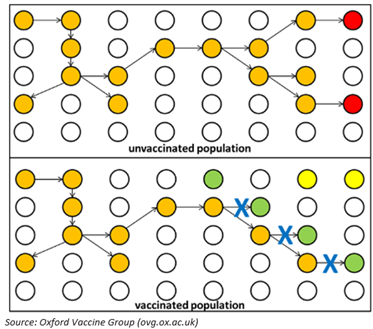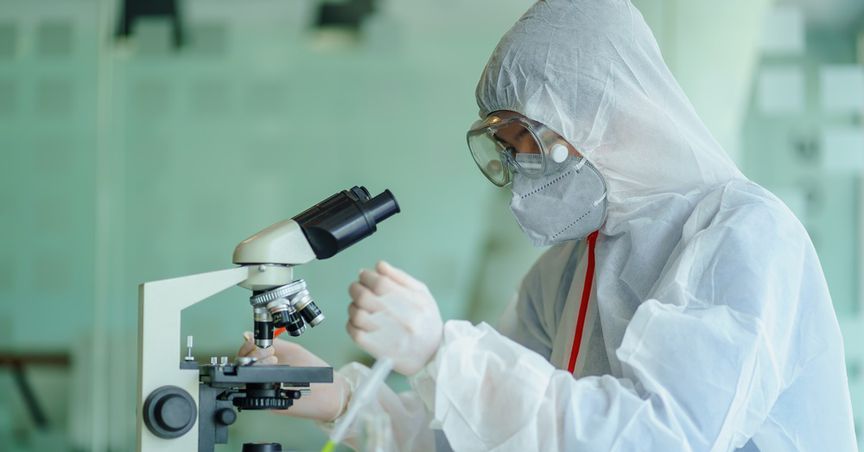COVID-19, a Public Health Emergency of International Concern, has affected more than 4.9 million lives, destroyed all the health systems and confined billions of individuals in their homes. The world is battling against a pandemic that has had a devastating impact on human life and the global economy.
MUST READ: Are We Very Near to the Breakthrough for Coronavirus Vaccine?
At present, everyone is waiting anxiously for a vaccine. Several studies are being conducted around the globe to develop a vaccine for the novel coronavirus. Although there are many scientific developments underway, the healthcare players and public health officials still anticipate it would take around a year to year and a half before the first vaccine against SARS-CoV-2 is available. Meanwhile, WHO experts warn that it might take 4 to 5 years to control this coronavirus.
ALSO READ: Prescription of Mental Health Medications Surges Amid COVID-19
Now some scientists are working to target herd immunity to survive the COVID-19 pandemic, let us delve deep and discuss herd immunity:
What is herd Immunity and How it works?
When an infectious disease enters an unvaccinated population, many people get infected because they lack immunity against the virus or disease. An essential element of this is determined by the maturity and strength of the immune system of the individual. For example, very young children and elderly and weak adults might be more susceptible to infection because of immune system defects.
Herd immunity occurs when several individuals in a community develop immunity to an infectious disease, which helps stop the infection from spreading further. This can happen in two ways - One way is where many people get the infection and in time, build up an immune response to it (this is called natural immunity). The other way is when many people get vaccinated against the disease to achieve immunity.

The above-represented image by the Oxford vaccine group shows how the herd immunity works. In this image, people are represented as circles. The virus spreads among the people shown in orange colour, although they do not have any severe infection. When the infection affects more people, and to those who are highly susceptible (represented in red), they get the infection and can be very sick or even it could lead to death.
In the second panel, the individual in green colour are vaccinated and now safeguard those who had previously caught the infection (in yellow colour) and reduces the possibility of getting infected.
However, this image only represents very few individuals being vaccinated, but the vaccine must be given to many people for herd immunity to work.
When a large percentage of the population becomes immune to a disease, the spread of that disease slows down or stops. Many viral and bacterial infections spread from person to person. This chain is broken when most people do not get or transmit the infection. This helps protect people who are not vaccinated or who have low functioning immune systems and may develop an infection more easily, such as- older adults, babies, young children, pregnant women, and people with certain health conditions.
COVID-19 and Herd immunity
Social distancing and frequent handwashing are currently the only ways to help prevent you and those around you from contracting and potentially spreading SARS-CoV-2, the virus that causes COVID-19.
Developments for a vaccine against SARS-CoV-2 are going on, and if the vaccine is available, then there is a chance of developing herd immunity against SARS-CoV-2 virus in the upcoming years. Almost all healthy adults, teenagers, and older children would require to be vaccinated for providing herd immunity for individuals who cannot get the vaccine or who are too ill to become naturally immune to it.
Is herd immunity working against COVID-19: There are numerous facts why herd immunity is not the answer for stopping the spread of the novel coronavirus.
- No vaccine for SARS-CoV-2: There are no vaccines for SARS-CoV-2 available yet and according to researchers’ vaccinations are the safest means to practice herd immunity in a population. The research for antivirals and other medications for the treatment of COVID-19 is underway.
- Researchers do not have any idea that if this virus could be contracted and develop an infection in an individual more than once. Individuals who contract novel coronavirus experience serious side effects; even severe cases can also lead to death.
- The exact mechanism of SARS-CoV-2 is Unknown: Doctors do not yet know precisely why some people who contract SARS-CoV-2 develop severe COVID-19 symptoms, while others do not. Vulnerable members of society, such as older adults and people with some chronic diseases, could become very sick if they are exposed to this virus.
- At this time if many people develop COVID-19, hospitals and other healthcare systems may be overburdened.
However, some investigations are also going on related to developments of herd immunity. As per some scientists, the coronavirus antibody study shows that herd immunity strategy is not working for controlling the spread of coronavirus.
Bottomline
Herd immunity is not the answer for preventing the spread of the novel coronavirus, and the safest way of getting immunity against this contagious disease is vaccination. Many researchers across the globe are working frantically to develop an effective vaccine against COVID-19. Currently, specific measures are required to prevent explosive outbreaks as most of the people stay uninfected with SARS-CoV-2. However, things are unlikely to get back to normal until a vaccine against COVID-19 is developed and widely distributed.
After the development of a vaccine for SARS-CoV-2, establishing herd immunity is one way to help protect individuals in the community who are vulnerable or have low functioning immune systems.
ALSO READ: Search for COVID-19 Vaccine; Top 10 Names Across the Globe



